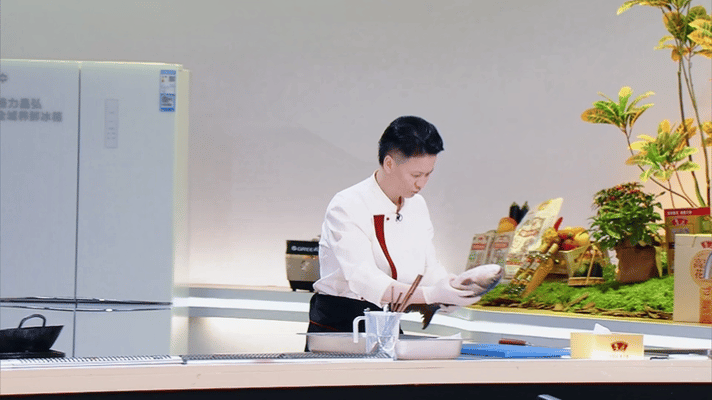Taste Chinese and French food and enjoy the Olympic feast. As the Paris Olympic Games is in full swing, a taste bud feast across national boundaries and a "symphony chapter" integrating Chinese and Western cultures are playing enthusiastically. At 19:30 on August 3, 2024, a large-scale Sino-French food culture exchange program "Peak Food Carving — — The third issue of the Sino-French Chef King Competition, Hidden in Gankun, will be broadcast on CCTV-2, so stay tuned!

For Chinese,
Visceral cooking is undoubtedly the most important thing in food culture.
An important chapter with rich colors
In France, visceral dishes
Also occupies an important position.
Showing its unique diet art
for thousands of years
A delicacy elaborately prepared with internal organs as ingredients.
In the years of spice tumbling and fireworks transpiration
Release the unique flavor to the fullest.
Lively and fragrant on the plates of China and France
"The Peak Food Carving — — Sino-French chef competition "The third program is based on
"Hidden Gankun" as the theme
Invited four new chefs from China and France.
In "Classic Deduction" and "Fusion Challenge"
Give full play to each other’s strengths in the two links
Show exquisite techniques and outstanding creativity
Explore more possibilities of delicacies.
↓ ↓ ↓

This program has a strong lineup of American food experts.
French President’s "Personal Food Representative"
French food ambassador
Guillaume Gomez joined heavily
Zhou Xiaoyan, Vice President of China Cuisine Association.
French Michelin three-star chef Glenn Weil
Professor Li Bo of Nanjing Normal University
Bai Ying, the host of Central Radio and Television Station.
Gao Bo, host of Central Radio and Television Station.
Common composition
They will start from their respective fields of expertise.
Discussion on "Animal Viscera" between China and France
Cooking skills and the essence of food culture
Bring a show to the audience
Double feast of knowledge and taste
↓ ↓ ↓
"women don’t let men"
In this issue, the new kitchen king is on the competitive stage.
Two handsome figures are particularly dazzling.
One is from Shanghai local cuisine.
Qin Zhuonan, a non-legacy chef
With perfect skill, she
Committed to carrying forward the cultural tradition of local cuisine.
The other is Zhou Bingjie, a rookie of Sichuan cuisine after 1990.
She majored in French and was interested in culinary arts.
Have original opinions and rich imagination.
And, of course, from France
Kerry, the chef who has traveled to major international events many times.
And known as
Tao Furong, an "artistic player in French cuisine"
In this peak competition,
How will they perform their stunts?
Let the internal organs of animals glow with extraordinary brilliance?
Let’s wait together!
↓ ↓ ↓
[Classic Deduction]
(herring bald lung)
If you haven’t tasted this delicacy.
You may find it hard to imagine.
Fish has such a gorgeous way to eat!
The name of the dish "Bald Lung" has nothing to do with the lung.
But with"Pure fish liver"Delicious delicacies deduced.
Dishes are a great test of the chef’s skills.
The whole process runs through the word "fine"
Select 10 herring livers to make a plate.
From live fish to liver, to frying and thickening.
Keep improving every step of the way.
Just for the perfect presentation of the moment when the pot is out.
The spoon and soup are lightly lifted, and the fish liver is saturated with rich marinade.
Tender, smooth and refreshing, oily but not greasy, with a long aftertaste.
Today, this dish
Because of its complicated manufacturing process, it is almost lost.
But it carries a hundred years of ingenuity and traditional skills.
Forever spread in the world, shining.
▽
(Gan Gao Tang)
Can you imagine?
This exquisite little butterfly in front of me
It’s made of pig liver!
This dish is one of the famous clear soups in Sichuan cuisine.
It is also the famous "set table soup"
The production process is comparable to "porcelain live"!
It needs many processes such as beating, boiling soup and taking liver sauce.
Strive for a crystal clear effect of pig liver.
Then it is carefully made into a butterfly shape with a mold.
Color, fragrance, taste and shape are all beautiful!
Finally, pour a spoonful of pure clear soup.
A bowl of beautiful and refined liver cream soup made a stunning appearance ~
Have a taste.
The texture of pig liver is as delicate and smooth as Mu Si.
Take a sip and melt between your lips and teeth.
Like a butterfly dancing lightly on the tip of the tongue
Bring a touch of fresh breath like spring.
▽
(Fat liver pigeon roll)
Choose the top fat liver with rich fat.
Wrapped in a layer of tender pigeon meat rich in protein.
After frying and cooking
The skin is golden and crisp, and the inside is soft and delicate.
Open across the board, the mellow foie gras and pigeon meat.
Delicious moment intertwined, fragrance overflowing.
In the 1980s.
Shandong Linqu took the lead in introducing France’s Lande Goose.
Opened a new chapter in China foie gras cuisine.
Later, this improved variety was introduced to Huoqiu County, Anhui Province.
Vigorously develop foie gras industry
Make Lund goose in this land.
Take root and sprout, rejuvenate
Today, among the foie gras exported by China to the world,
About half of them are produced in Huoqiu County, Lu ‘an City, Anhui Province.
Exchanges between China and France in foie gras industry
It also made foie gras step by step.
Ordinary people’s dining table
▽
(Caen tripe)
A fusion of tripe, trotters and potatoes.
French cuisine with carrots
Its uniqueness lies in not adding a drop of water.
Stew only with stock and cider juice.
Together to achieve the extraordinary fragrance of tripe.
This dish originated in Caen, Normandy, France.
History can be traced back to the 11th century.
Used to be a delicacy on William Ⅰ the Conqueror’s desk.
In the 15th century, it was a symbol of peace.
Shine brilliantly at the banquet celebrating the end of the Hundred Years’ War.
Since then, it has become a food business card of Normandy.
2024 Paris Olympic Games
The China delegation is in Deauville, a coastal town in Normandy.
Carry out adaptive training
Caen tripe as a gourmet bridge connecting the friendship between the two countries.
Once again witness the glorious moment of peace and exchange.
↓ ↓ ↓
[Integration Challenge]
(Sino-French Integration Carnival)
When the traditional craft of pork sausage rolls braised pork
Encounter French-style black truffle potato balls
Chinese and French food cultures collide and merge here.
What kind of wonderful flavor is it?
Let the members of the tasting group call "delicious"!
(gorgeous fireworks)
Chinese hot kidney flower and French brandy juice are ingeniously blended.
Serve with fresh lobster meat and rare morels.
Cross-border collision of land and water ingredients
The skills are fully displayed in the fire.
Like gorgeous fireworks in the night sky.
Every bite is a taste and visual enjoyment.
……
From Classic Cuisine to Fusion Cuisine
Every dish carries a load.
The massiness of history and the blending of culture
As the Olympic spirit pursues Excellence and peace.
Sino-French food culture is also constant.
In the communication and collision, it blooms more brightly!

At 19:30 on August 3, let’s lock in the CCTV financial channel "Peak Food — — Chinese and French Chef King Competition, experience this delicious and cultural journey across national boundaries, feel the unique charm of Sino-French cultural blending, and let taste buds and hearts indulge in this peak feast together!





































